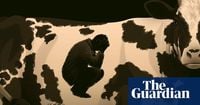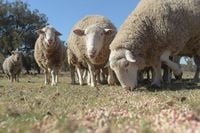In a significant political shift, Australia’s opposition party, the Liberal-National Coalition, has pledged to repeal the ban on live sheep exports if it secures victory in the upcoming federal election on May 3, 2025. This commitment comes as the current Labor government aims to end these exports by 2028, a move that is poised to deeply impact farmers in Western Australia, a pivotal region for the election.
According to government data, Australia exported approximately 652,000 sheep by sea during the 2022-23 period, a stark decline from the 5.92 million sheep exported two decades ago. The Labor government has already passed laws to enforce this future ban and has allocated a transition package of A$107 million (about $68.2 million) to support affected businesses.
As the election approaches, the opposition's stance on live sheep exports is gaining traction among farmers and industry stakeholders who fear the loss of their livelihoods. The Liberal-National Coalition argues that the ban will harm the agricultural sector and lead to job losses, particularly in rural areas where sheep farming is a vital source of income.
However, the issue of animal welfare in the live export industry has come under intense scrutiny. A four-month investigation by The Guardian has revealed alarming instances of animal cruelty within Australia’s export abattoirs. Veterinarians stationed at these facilities have reported severe lapses in animal welfare oversight, including an incident in 2022 where over 100 sheep died from hypothermia after a nine-hour truck journey through heavy rain.
Leaked documents from the investigation highlight a troubling pattern of unreported animal welfare breaches. In one shocking case, a veterinarian found a cow with a decomposing calf stuck in its pelvic canal, yet the incident was not reported to state regulators. Instead, the vet faced an apology to the abattoir owners after intervening to assist the suffering animal.
Whistleblower accounts from veterinarians reveal an understaffing crisis in New South Wales, where some abattoirs have gone without proper oversight for extended periods. A joint complaint filed by more than half of the state’s export abattoir veterinarians warns that the situation poses a significant risk to Australia’s compliance with international trade obligations.
"The current system is failing to protect animal welfare," one veterinarian lamented, describing how powers to detect and act on breaches have been progressively weakened. Changes to regulations have restricted veterinarians' access to animal pens, making it difficult to conduct thorough inspections. At least one veterinarian has been diagnosed with PTSD due to the trauma of witnessing repeated instances of neglect and cruelty.
Despite these alarming revelations, the federal agriculture department has rejected claims of compromised oversight, asserting that it maintains adequate staffing levels and takes necessary regulatory actions for breaches of animal welfare. However, critics argue that the department’s dual role in promoting meat exports while monitoring animal welfare creates an inherent conflict of interest.
Animals Australia, a leading animal protection organization, has long criticized this conflict, suggesting that the system is set up to favor industry interests over animal welfare. "The culture of bullying and intimidation faced by on-plant veterinarians has led to a slippery slope for animals," stated Shatha Hamade, the organization's legal counsel. She emphasized the need for an independent body to oversee animal welfare, free from the pressures of the meat export industry.
As the election draws near, the debate over live sheep exports is intensifying. Farmers and industry advocates are rallying behind the Liberal-National Coalition’s proposal, viewing it as a lifeline for their livelihoods. Conversely, animal welfare advocates are pressing for stricter regulations and accountability within the export meat industry.
The upcoming election is set to be a pivotal moment for Australia’s agricultural sector, with the future of live sheep exports hanging in the balance. Farmers are concerned that a ban could exacerbate their economic struggles, while animal rights groups are determined to ensure that animal welfare is prioritized in any future legislative decisions.
In conclusion, the clash between economic interests and animal welfare is at the forefront of Australia’s political landscape as the nation prepares for a critical election. The outcome will shape not only the future of live sheep exports but also the broader conversation about how Australia balances its agricultural practices with ethical considerations regarding animal treatment.





